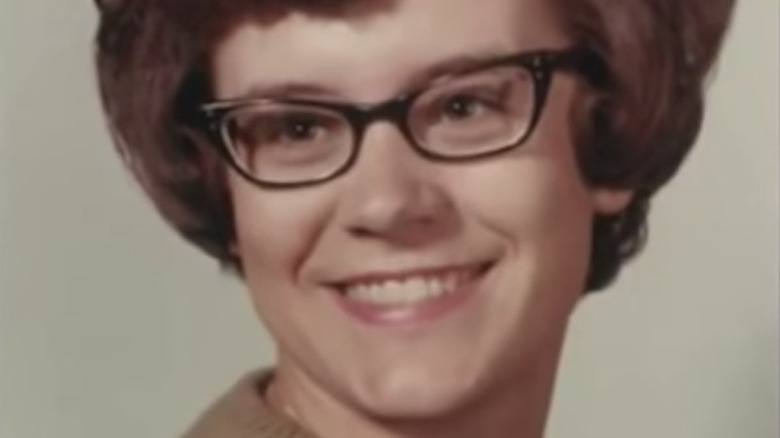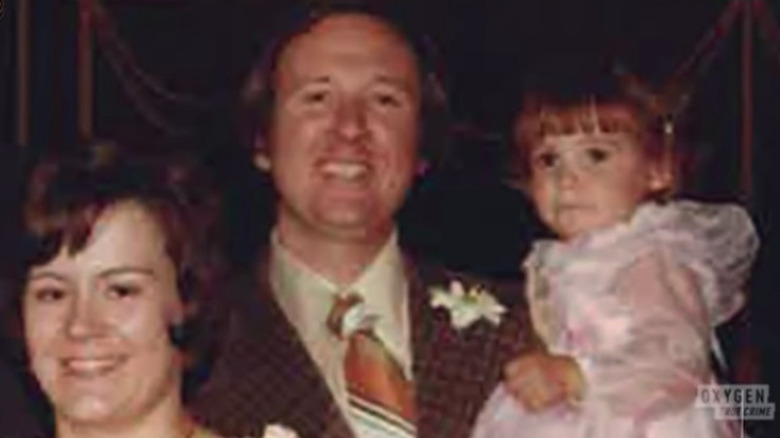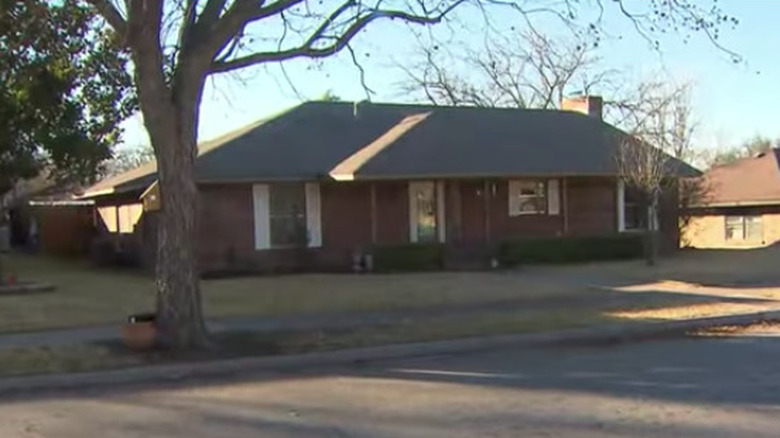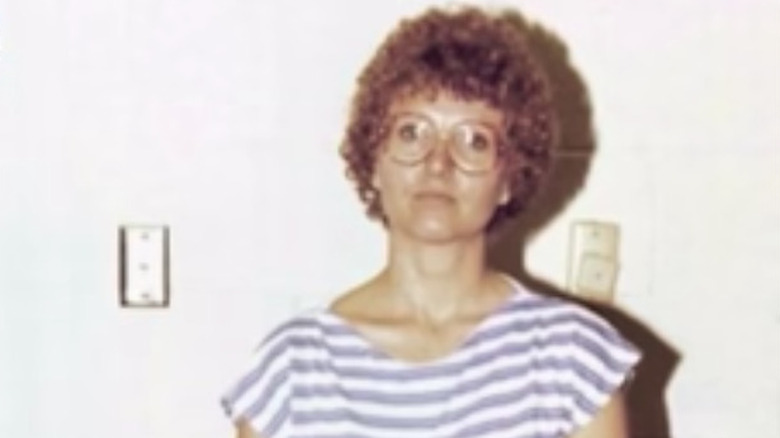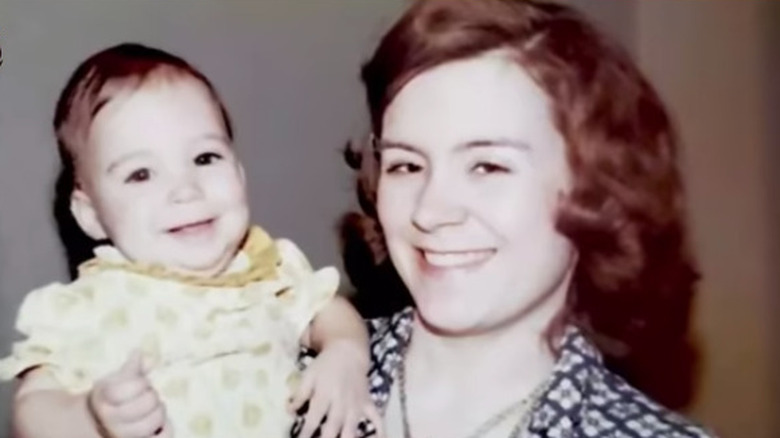Love & Death: The True Story Behind The Murder Of Betty Gore
In 1980, an ax murder rattled a small, sleepy town in Texas. The victim was struck 41 times and alarmingly, it occurred on Friday the 13th. However, this wasn't the over-baked plot to a campy horror film or novel but the true story behind two suburban housewives amidst a love triangle. On June 13, 1980, bubbly church-goer Candy Montgomery killed best friend and school teacher Betty Gore. The story was sensational and captured the attention of Wylie, Texas, partially because it began with the soapy love affair between Montgomery and Gore's husband. The two began a liaison that lasted nearly a year. Just as they thought they had gotten away with it, their transgressions caught up to them and eventually resulted in a murder trial.
The real-life horror is now being adapted by two different streaming services. Jessica Biel will star as Montgomery in Hulu's "Candy" while Elizabeth Olson will play the same part for HBO Max's "Love and Death," per TV Insider. Here is the true story behind the macabre murder of Betty Gore.
Candy and Betty were best friends
The Montgomerys and the Gores were so close that on the day Candy Montgomery killed Betty Gore, their kids spent the day together, chauffeured around town by Montgomery herself, per Texas Monthly. Even in the thick of Montgomery's affair with Allan Gore, she continued her friendship with Betty. She threw a surprise baby shower for the pregnant Gore during a church choir dinner a month before her due date. The two were devoted members of the Methodist Church of Lucas' choir, and because their lives revolved around church, they often bonded, according to Texas Monthly.
But friendship turned to hate in the last moments of Gore's life. Montgomery claimed that Gore came after Montgomery with an ax after her affair with Allan was discovered. Even when Gore had slipped and lay helpless, her head bleeding from a hit Montgomery gave her early on, Montgomery kept attacking her. Most of the hits came when Gore was already unconscious, according to the Dallas Morning News.
Candy and Allan Gore thoroughly planned their affair
Candy Montgomery and Allan Gore approached their affair in such a perfectly planned way that it made their unconventional relationship even more so. They had only known each other for nine months when they met at their church volleyball court, and Montgomery loved the way he smelled. She ignored his physical shortcomings and decided to pursue a covert affair with him, and she patiently waited for him to acquiesce. Gore, surprised and flattered by the attention he rarely received, agreed.
Before they actually had begun an affair, Montgomery set up a pros and cons list. Afterwards, they set up rules to abide by, which included: avoid becoming too emotionally invested, meet only on weekdays at Como Motel, all expenses would be divided equally, Montgomery would be responsible for lunch, and if it became too risky, the affair would have to end. Their affair lasted nearly a year and ended soon after Gore's second child was born, according to Texas Monthly.
Betty had a fear of abandonment
Betty Gore, born Betty Pomeroy, was a likable and popular girl from the small town of Norwich, Kansas. Allan Gore was her math teacher in college. He was shy and plain-looking, and their decision to marry was met with some raised eyebrows. Betty's personality seemed to change during married life; she became emotionally dependent on Gore, whose job at Rockwell International required him to travel. Betty became an unhappy schoolteacher who regimented her and Allan's sex life in order to plan her next pregnancy. Allan became unhappy as a result, per Texas Monthly.
Betty's fear of abandonment grew stronger, and she resented her husband's traveling and business trips that came with a new job. It's also possible she was suffering from postpartum depression, per Oxygen. (Around the same time, Candy Montgomery's and Allan's affair deteriorated after Betty gave birth to their daughter, Bethany.) Betty and Allan started attending a marriage counseling program called "Methodist Marriage Encounter." It was an intense weekend getaway program where couples were expected to bond without television or any distractions. Here, Allan admitted that he no longer felt close to Betty and hoped to patch up their marriage. Betty shared her personal shortcomings and some ominous feelings: although she never feared for her own safety with Allan around, she hated being alone, per Texas Monthly.
Candy was popular in her community
Candy Montgomery, born Candy Wheeler, was an army brat as a child. Her family was constantly moving, which probably affected Montgomery's later boredom in her stable marriage to Pat Montgomery. She was confident and upfront and was responsible for initiating the affair with Allan Gore. Her marriage had grown stale, and she sought something exciting.
She was considered the most attractive woman at their Methodist church. Like Allan Gore, she loved kids and was alway involved in the community, per Texas Monthly. And when news of Montgomery's grisly murder spread throughout town, a friend of hers told the Dallas Times Herald that Montgomery didn't have it in her to commit such a crime (via the Dallas Morning News). She was so well-liked that after she had been released on bail, she and her family received numerous messages of support from their friends and the church. Montgomery took the time to respond to Hallmark cards from people she hadn't seen in years, per Texas Monthly.
Betty was struck 41 times
During her brawl with Betty Gore, in which they both tried to gain control of the ax, Candy Montgomery had nearly escaped the room. She had hit Gore in the head, drawing blood, and found an opportunity to bolt for an exit, but Gore didn't let her go, according to Montgomery's testimony in court (per Texas Monthly). Something flipped in Montgomery's head when Gore told her "shhhh." She switched to attack mode, grabbed the ax from Gore's hands, and rained 41 blows on her. 28 of them went to Gore's head, per the Dallas Morning News.
In court, Montgomery cried while retelling the incident and didn't deny killing her former friend. She shrieked in agony when presented with the ax in court, and begged not to be forced to look at it, per Texas Monthly. Lester Gayler, the Gores' next-door neighbor who went to check on Betty at Allan Gore's request, said the crime scene was the worst he'd ever seen. He recalled seeing blood everywhere and ax marks as high as the ceiling. He remembered seeing Montgomery the next day and said she acted normally, as if she had not been involved, per CBS News.
Candy pretended nothing happened after the murder
After Candy Montgomery killed Betty Gore, she went about her day as usual. She even cleaned herself at Gore's house before she left, leaving the Gores' 1-year-old baby alone crying in her crib, according to the Dallas Morning News. She went home to change her clothes and bandage a cut she received on her foot during her fight with Gore. She then picked up her kids — along with the Gores' daughter Alisa — from church. She told a friend that she had seen Gore earlier in the day and spent so much time chatting, that it left her no time for other errands. Later that afternoon, Montgomery took her kids and Alisa to the movies and watched "The Empire Strikes Back." That night, Alisa slept over, according to Texas Monthly.
Montgomery even lied on the phone with Gore's husband, Allan Gore. Allan was concerned since Betty was not answering her phone all day. Montgomery told him she saw Betty that morning to pick up Alisa's bathing suit and said Betty seemed impatient for Montgomery to leave. She falsely said that Betty was doing okay and was busy sewing. When it was already nighttime, Montgomery found out from others that Betty might've died. She only slept for three hours. The news broke around town the next morning, when Alisa was still over at the Montgomerys' house, according to Texas Monthly.
Candy said Betty attacked first
To convince the jury that Candy Montgomery acted in self-defense, Montgomery's lawyers painted a picture of a confrontational and vengeful Betty Gore. Gore had just put her baby to sleep when Montgomery arrived at her house. Montgomery intended to ask Gore about taking her daughter Alisa to her swim class since Alisa wanted to join the Montgomerys for their trip to the movies. But Gore invited Montgomery into her living room, where she confronted Montgomery about her affair with her husband, Allan. Montgomery admitted to it, and Gore excused herself from the room and returned with an ax.
They argued for a few minutes, and Montgomery apologized. Her expression of remorse may have set off Gore, because she then pushed Montgomery into the utility room of her home. She held her ax threateningly in the air, warning Montgomery to stay away from her husband. Montgomery assured her she didn't want to be with Allan, but Gore was determined to kill Montgomery. She hit Gore on the head once, and the two women began to jostle for control of the ax, according to Texas Monthly.
Candy's legal defense used hypnosis
Since Candy Montgomery admitted she was the last to see Betty Gore alive and because Allan Gore disclosed their affair to investigators, Montgomery became the top suspect and was soon charged with murder. Her affair with Betty's husband was considered a motive, and she was arrested on June 27, 1980, per The Independent. But Montgomery denied those charges and was perhaps reticent on the events of that fateful day, because her lawyer enlisted the help of a psychiatrist and a clinical hypnotist to probe into her version of the incident. The session must have been intense because a witness who was sitting in the waiting room recalled hearing several shrieks from the doctor's office, according to Texas Monthly.
Dr. Fred Fason conducted three strenuous hypnosis sessions, from which they pieced together a narrative about what happened at Gore's home. According to Texas Monthly, her non-hypnosis account sometimes clashed with her hypnosis account, after which her lawyer, Don Crowder, worked to straighten out the facts. What amounted from her hypnosis was a confession, which led to her self-defense plea.
Candy was triggered by childhood trauma
What emerged from Candy Montgomery's hypnosis was a tale of childhood trauma. She recalled a moment from when she was 4 years old that would end up affecting her for the rest of her life. After losing in a race to another child, Montgomery threw a jar in anger. Her mother responded to her emotions by shushing her. While testifying in court, Dr. Fred Fason believed there was a connection to her mother's punishment and a moment during her tussle with Betty Gore that unleashed Montgomery's rage, per The Independent. According to Montgomery's court defense, just as Gore was losing her fight against Montgomery — she had already been struck in the head by Montgomery — she regained control of the ax, put one finger to her lips and said, "Shhh."
That noise dredged up the childhood trauma. In one moment, Montgomery took back the ax and made the fatal blows against Gore's body. According to Texas Monthly, Montgomery was thereafter motivated by hate and her own indignation against Betty's attempted revenge. The justification served a purpose; self defense can be accounted for with a few hits, but how do you explain a total of 41 ax blows to the jury?
Candy was not found guilty
Candy Montgomery's self-defense and childhood trauma explanation was sufficient for the jury — she was found not guilty. The deliberation took less than four hours. Montgomery was reported as having "no emotion" when her verdict was read, according to The Independent. The judge, Tom Ryan, asked those in the packed courtroom to remain calm and abstain from any outward reactions.
Montgomery had struck a woman 41 times and had gotten off scot free; the surrounding community was shocked. After all, people had gone to jail for far less, and so this felt like a case where justice wasn't being served, according to the Dallas Morning News. Plus, immediately after the news of Betty Gore's death, they'd all been terrified, thinking this was the work of a mass murderer. Montgomery had to be escorted by security since she had received a death threat, and it was then that she finally broke down into tears. As she rushed to her attorney's car to escape the mob, she was surrounded by chants of "Murderer!" (per United Press International).
That said, some citizens weren't surprised by the verdict since they felt the prosecution did a less-than-stellar job. Juror Alice Doherty said the amount of blows Montgomery inflicted on Gore didn't sidetrack them from what they thought was most important in her case: self defense, according to the Dallas Morning News.
Candy now has a new identity
Soon after her acquittal, Candy Montgomery told reporters that she wanted to move on and return to her usual life. She did as much of that as she could. Her family moved to Georgia, and she later got divorced, allegedly reverting her last name back to her maiden name, Wheeler (via Newsweek). She became a certified family counselor, according to the Dallas Morning News. But a past like Montgomery's is virtually inescapable. According to Collin County's Local Profile, Montgomery's counseling practice gets bad reviews online, with people decrying her as a bad person. 20 years after the incident, the Dallas Morning News reached out to Montgomery for comments, but she rebuffed them, saying, "I'm telling you in big bold letters I'm not interested."
Initially, there were mixed feelings about Montgomery's freedom. Betty Gore's father, Bob Pomeroy wasn't pleased with the verdict but knew Montgomery would have to live with her actions, per United Press International. Gore's next-door neighbor, Lester Gayler — who still lives in the same home that he did at the time — told CBS News that he believes justice wasn't served and Montgomery killed Gore because her affair was discovered.
The case affected nearly everyone involved
Allan Gore remarried shortly after the trial, but that eventually ended in divorce. He also lost custody of his two daughters, who were raised by Betty Gore's parents, according to Collin County's Local Profile. Several years after the trial, Candy Montgomery's attorney Don Crowder said that the faces of Gore's family still haunted him. He was afraid that they didn't comprehend his job in defending their daughter's killer. He also had mixed feelings about the legacy of that case on his career, saying, "That case was maybe the zenith of an extraordinarily successful career, or the demise of what could have been" (via the Dallas Observer). Crowder committed suicide in 1998, seemingly motivated by other perceived failures in his life and career.
The killing also effected the small town of Wylie, Texas. Not much happened usually in Wylie, so when a schoolteacher was murdered with an ax, fear overtook the town, and stores began to close down early. It continued even after Montgomery's arrest. Fire marshal Steve Deffibaugh, who had been at the crime scene, said he still thinks about the killing every June 13, according to the Dallas Morning News.
If you or anyone you know is having suicidal thoughts, please call the National Suicide Prevention Lifeline at 1-800-273-TALK (8255).
